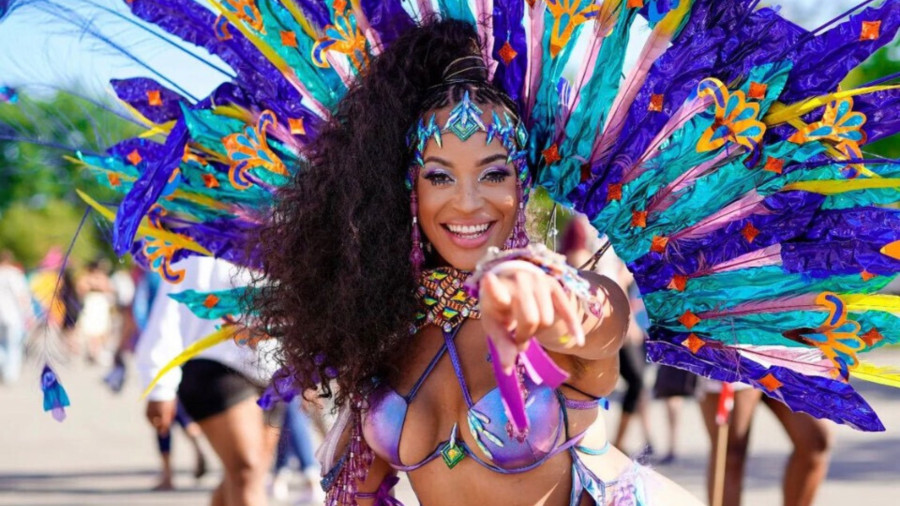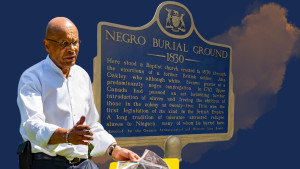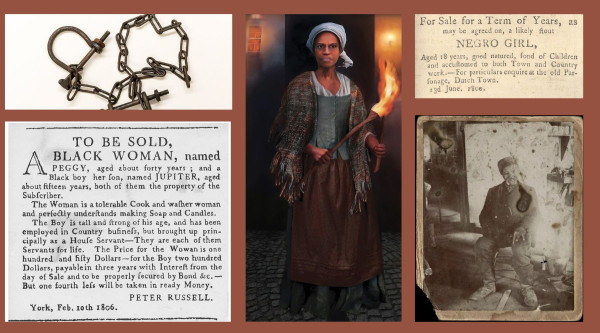Something felt amiss. It wasn’t the air of fete and revelry I expected to come across. And everything became abundantly clear once I came upon the parade.
The pandemic kept us all at bay. It’s been two years since we were all on ‘de road’ to celebrate Emancipation Day and the unmistakable island camaraderie we hold dear. There’s nothing like it. The freedom to free up oneself, socialize and, as Shadow sang, dingolay. Yet in the renewal year, a year when everyone was excited at the prospect of playing mas and seeing loved ones on the road again, conversations about the Grande Parade outcome have ranged from exhilaration and happiness to anger and disappointment.
Barbadian-born Kiwana Scott is a veteran Masquerader. This year she played with Carnival Nationz but has been suited up playing mas for the past 20-plus years. Her carnival beginnings started back home as a kid. So it was only natural that she would continue the tradition when she moved here. Many people play mas for various reasons. Scott plays because of the significance and history. “I started playing mas because it helped me celebrate my roots. I'm not a descendant. I'm Bajan-born. Although I grew up here for most of my life, I think I started playing mas specifically because it helped me feel closer to being home.”
Lateisha Williams, aka Carnival Bae, has been playing mas for 15 years. This year, she also played for the Carnival Nationz team. Her road to carnival launched on another note. “I started when I was 18 because it seemed like something fun. I just wanted to have fun with my girls outside our daily lifestyle. [After having my daughter] I ended up modelling for Toronto Revelers. That's when I started to learn more about the culture. I would be in the mas camp a lot. I started listening to conversations and understanding that this is more than, as everyone says, a street party.”
Scott’s issues with the parade this year ranged from the discombobulating new route to the massive confusion for parking, judging and starting points. While Williams didn’t mind the newness of two starting points, like Scott, she prefers the straight Lakeshore run.
Caribana is now known as a common street party, but actually, it's way more than that.
Its history dates back to slavery and our emancipation from the British Empire in 1834. Emancipation Day is celebrated on August 1 in former European colonies in the Caribbean. The carnival tradition was put into play here by the Caribbean Cultural Committee at Toronto’s first Caribana in 1967.
Looking back at Caribana’s humble beginnings, it was established upon Trinidad and Tobago’s carnival model. So it’s evident that the committee implemented the traditions, roots, culture and foundation from the start. I asked the ladies if they felt the same concept was still being respected today and they had a lot to get off their chest. “Yes and no,” said Williams. “I think some people still care and celebrate for the right reasons. I also think some people just want the clout. They do it for fame. They do it to get posted on Island Mix, Team Soca and all those big pages. They do it for popularity. But most people do it because they understand what we're celebrating. So I think it's still alive.”
Scott, on the other hand, is not as optimistic. It’s a jump across the spectrum, from fame and knowledge of history to dismantling education, inclusion and unity during carnival. “I'm going to separate the committee from the mas bands because I feel the mas bands and band leaders are also to blame for this. If I remember in my early twenties, when I started participating, it was all about including other people in the culture and not just in making the costume,” declared Scott.
She continued, “It was helping them to understand the reason behind it, such as the importance of having all of these significant themes. Why do costumes look the way they look? Because they look way different then than they do now. Why does so much effort go into creating this theme, building it, and portraying it? And then making sure that the culture is kept alive for the vast number of us Caribbean people who either immigrated to this country or were born here to Caribbean parents.”
{https://www.instagram.com/p/CgzJQ4egT7e/}
Back then, there was clear communication. The messaging was sold to us in advertising and numerous visits from various media outlets to mas camps. And clearly, we don’t mean a few days before the parade. There was coverage from the time the new season jumped off—from the inception of the band launch leading up to King and Queen. There were questions about production and interviews with band leaders. Remember the advertising campaign with the tagline ‘respect de mas?’ Over the years, all messaging has devolved, leaving the crucial particulars behind.
But even though both ladies have their share of perspectives, they both agreed that they had a great time until the inevitable happened: Stormers.
Stormers are the bane of every Masquerader's existence, and it's all anyone who played mas was talking about this year. The inconsideration and blatant irreverence to the parade and the masqueraders were at an all-time high. And let’s be clear, the blame doesn’t rest solely on the city’s influx of attendees. Many right here at home fall in line with the flippant behaviour. “God bless the section leaders. God bless the band leaders. God bless the men who drive the trucks. God bless the volunteers. Wow. Those who had a truck and came out put on their t-shirt and tried to keep mas from Stormers. God bless them all,” said Scott. “They do the very best they can, but there are only so few of them and so many of the others. They just can't keep up. It even gets to the point where people are offended by you wearing a costume! People were offended that my feathers hit them. In my mind, I'm thinking, are you frigging kidding me? Are you aware that I'm supposed to be where I am? I'm not sure that you are, though.”
Williams shares her experience, saying, “It was bad. It was really bad. It felt worse than in previous years. Thousands of people are still storming. It's their attitude. They're so rude. They feel so entitled. They don't make way for you even when you say excuse me. They get ignorant. You don't belong here, but then you have the audacity to now give people attitude and push through.” It’s that sense of entitlement from Stormers, that wrong and strong mentality that has everyone in an uproar. And rightfully so. Both Scott and Wiliams wholeheartedly agree with this issue. Honestly, any Masquerader would. When asked what could be a couple of things in question that could change perception, both Williams and Scott were insistent on education and etiquette.
Carnival is not just about playing mas. This topic of educating people may not sound like a surefire hit, but it is a giant puzzle piece in the grand scheme of things. However, this can only work if everyone does their part. This includes the committee, band leaders and everyone down the line. “I've expressed this to them [the committee] directly. So, this is nothing that will come back to me about, ‘Oh, Tisha said this.’ I see them reposting pictures about what's your favourite food. No one cares. We want to understand why you celebrate carnival, and there's nothing like that on their socials. People don't go on websites anymore, especially the younger folks. So you can have all this information on your website, and it's there. I've seen it. But nobody goes to your website for all that information. So you celebrate the emancipation date—but what is the emancipation date? That should be a post on your social media, just as it is on your site.”
“So that's one perspective. But then you have all the bands. These bands have 20,000 or 30,000 followers. Why do you have nothing posted about why we celebrate carnival? You talk, ‘Oh, I have twenty-two wins. I have eight wins. I have twenty-nine wins.’ That's nice. That doesn't mean anything to Masqueraders because we don't get your money. We don't get any recognition. Yes, we played mass, and they won, but we don't know why we won. We don't know what we're winning. So I think everyone plays a part. As much as I have a voice, I don't have enough of a voice. Only so many people can say, ‘Oh, Carnival Bae said this…’, but everyone else is doing something else.
{https://www.instagram.com/p/Cgws0KmOzdH/}
While Scott agrees with the above, she adds her take on teaching carnival etiquette. “Whoever the committee is, they need to do a better job of educating people about the parade. The culture is one thing. The reason we do it is one thing, but no one ever talks about the etiquette of the parade.” We, as Masqueraders, talk about etiquette in terms of how we dress. You know whether to wear stockings, what shoes to wear, how to stay hydrated, and where to put your money. Things we can do when you feel like you're being violated in any way, whether it's sexually or whatever. We have conversations, and you have people like Carnival Bae and others out there who put this information out for us. It's important for first-time Masquerades.”
“People who do that are amazing. Teach etiquette about attending the parade as a spectator. You know, as opposed to the etiquette of a parade, if you're participating because people seem to blend those two things and they are not the same. So doing some education surrounding that and then doing some education or offering some options would be great.”
Between Scott and Williams, ideas, comments and questions are a tonne to be shared. And I’m sure if the committee did a town hall discussion, there would be much more to follow.
Carnival brings in almost a whopping $440 million into the Toronto economy. It’s not just a street party; it’s a machine with many mechanisms. But that’s a whole other article.
Why can’t a security firm be hired? Where is the transparency about where the funding is going? How can the up-and-coming younger minds be included on the committee to facilitate fresh new ideas? Do we need a Caribana app? How can that government-donated $1 million in pocket change go to better use?
These listed concerns have all been brought up in some context over the years. This is not news by any means. How can we progress and move forward together?
Scott has chosen not to play mas in Toronto again until she sees some much-needed changes take effect. You can catch her on the road back home in Barbados for Crop Over next year, where I’m sure many others will be too.
Williams is set on staying home and representing her hometown, and she hopes to see many changes take place as well.
The outcries are loud and heavy this year. So as the planning gets underway for the 2023 Toronto Caribbean Festival, the big question is, what’s next?

 By
By 





